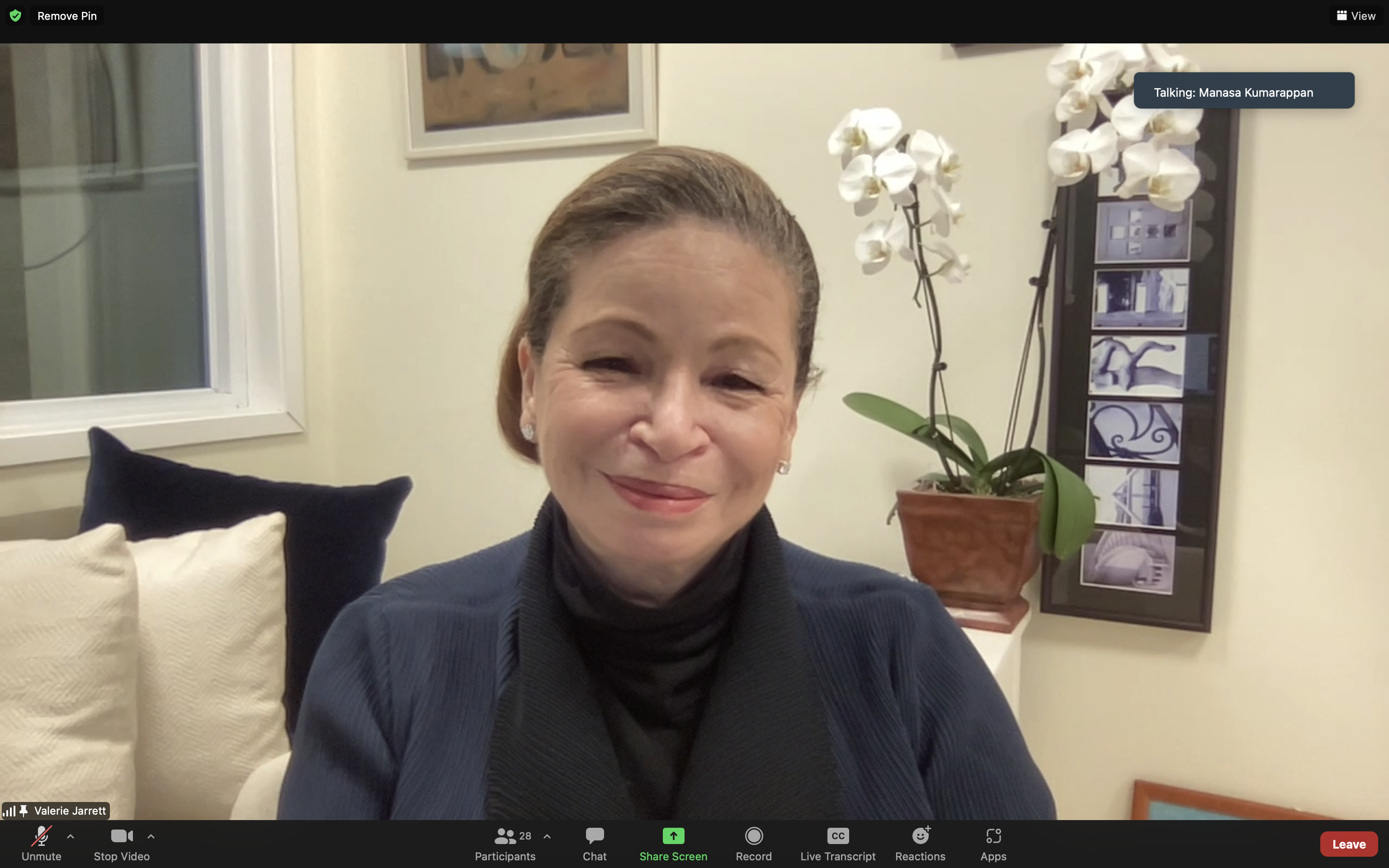“Good governance is good politics,” said Former Senior Advisor to President Barack Obama Valerie Jarrett ’78 during a Thursday event.
The event, hosted by Stanford Women in Politics, was held on the one-year anniversary of the Jan. 6 Capitol insurrection.
Early on in her career, Jarrett was involved with Chicago municipal politics, an experience which she said was formative for her mindset on approaching politics “with the view of what’s in the best interest of the people we’re here to serve.” Later serving in the Obama administration from 2009 to 2017 as one of three senior advisors and assistant to the president for intergovernmental affairs and public engagement and now serving as the interim president of the Obama Foundation, she still maintains this viewpoint.
“You run politics in the campaign, but when you’re in office or when you’re serving someone in office, it’s supposed to be about service,” she said. “It’s supposed to be about constituents, and it’s supposed to be blind to what party they are.”
And while no policy is perfect, Jarrett urged progress, citing the Affordable Care Act (ACA) and its challenges as a prime example. While the policy was particularly time- and labor-intensive, Jarrett said it was monumental to the Obama administration’s legacy as it addressed a “broken” healthcare system.
She lamented the “dysfunctional” nature of Congress in the status quo, describing the “razor-thin margins” on which the ACA passed and the immense politics that played into the voting process in the House and Senate. In the end, however, Jarrett celebrated the accomplishments achieved by the policy for people across the country and remembers the night it passed as “euphoric.”
Jarrett contended that the ACA leaves room for future improvements, such as a public option policy that she fought hard for but that ultimately did not make the final bill. The goal is to do as much as possible, even if “you don’t get it all done on the first try,” Jarrett said. She likened incremental progress to a baton passed through generations and emphasized the need for bipartisanship to make sweeping changes.
“I don’t think we have enough people who are willing to say that ‘if I lose my election doing good work, that’s a noble cause,’” she said.
Jarret also emphasized the importance of communication in promoting progress — “stop talking at each other, and start talking with each other,” she said. While she acknowledged the power of social media, she warned against the echo chambers cultivated by the algorithms that make people unwilling to engage with ideas outside of their own perspectives.
“We’ve got to get outside of our own comfort zones and get into circles that say things that make us uncomfortable and listen so that we can try to figure out how to move those people,” she said. “We can’t just ignore them and say it’s ‘noise;’ we have to try to understand and communicate, and I say that knowing how really hard it is to do that in this current, rather toxic, climate.”
Jarrett also described the difficulties of navigating a political climate where people cannot even agree on the reality and gravity of the Capitol insurrection, citing the disparate vocabulary politicians use to describe it.
Outside of her work under the Obama administration, Jarrett has also spent much of her career advocating for women’s rights and representation in the political sphere. She celebrated recent increases in diversity, such as the record number of Black women elected as judges in Harris County, the largest in Texas, in 2018. Nevertheless, she explained that “there are far too many Americans who are still uncomfortable with women in positions of power,” and that generational sexism is why it is all the more important to get more young people voting and involved in politics.
While Jarrett has gained significant political capital over the years, she described herself as a “late bloomer to politics.” She cited a summer abroad in London, where she studied comparative American and British legal systems, and the support of her best friend Gwen Poindexter ’76, whom she met on her first day of classes at Stanford, as catalysts for her pursuit of law school. She also reminisced about meaningful service opportunities she engaged with throughout her undergraduate career. Jarrett recalled the first demonstration she attended: protesting apartheid in South Africa at White Plaza.
In light of her experiences, Jarrett advised attendees to make the best of their years at Stanford, even amid the pandemic.
“What Stanford did for me is open my eyes to infinite possibilities,” she said. “The relationships you build will serve you well if you nurture them.”
